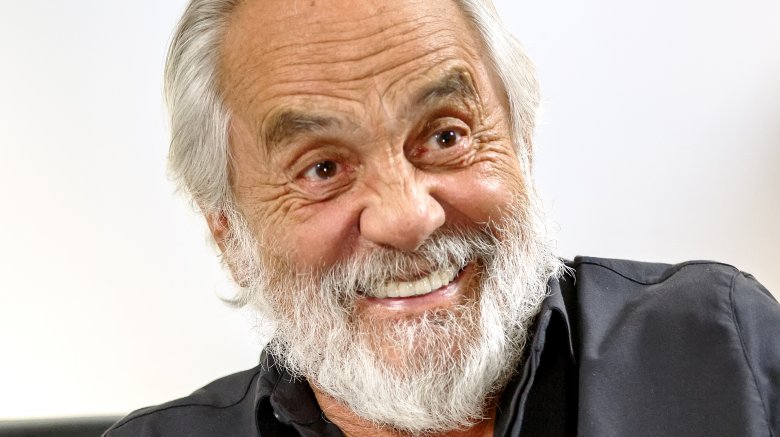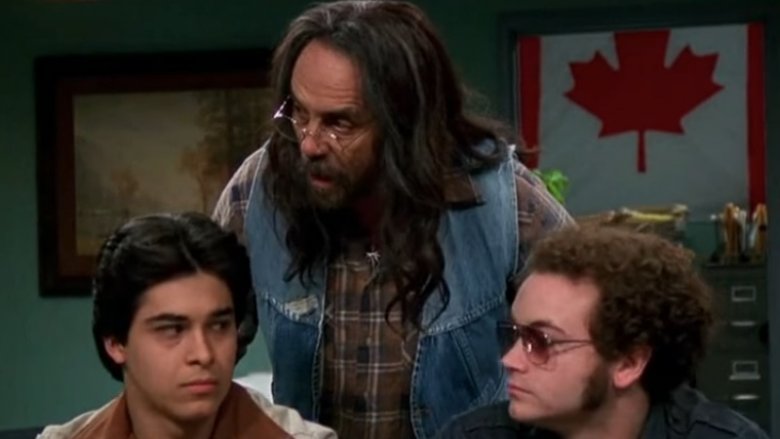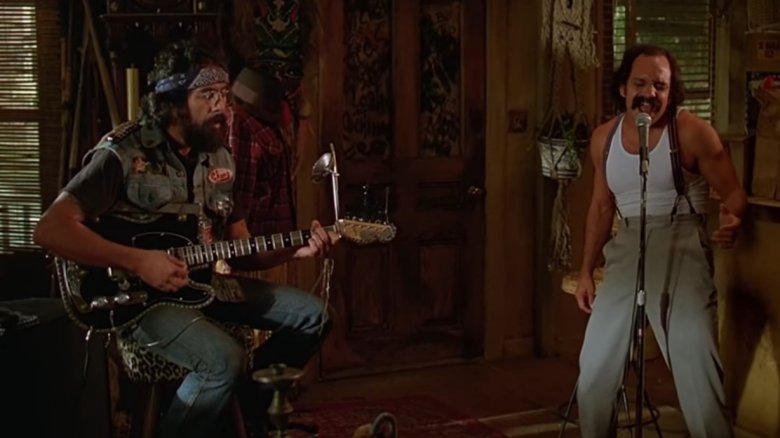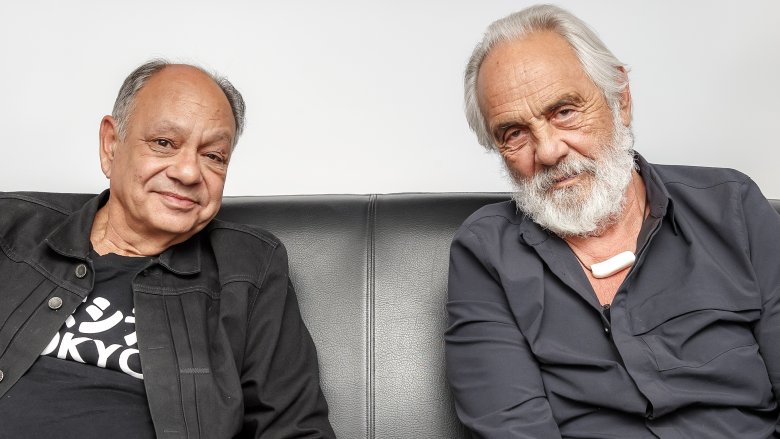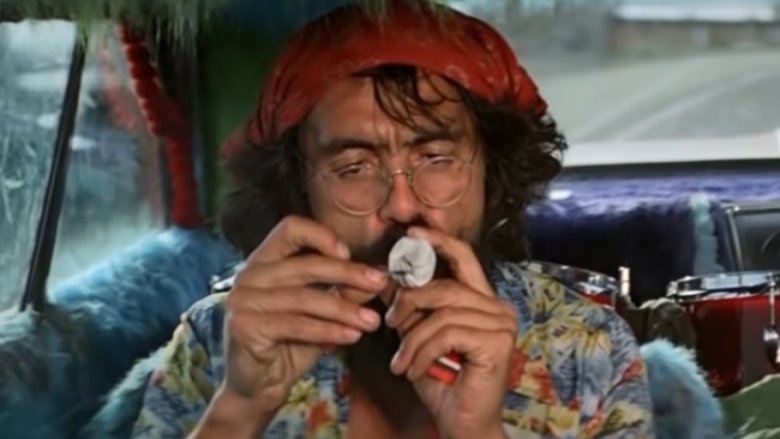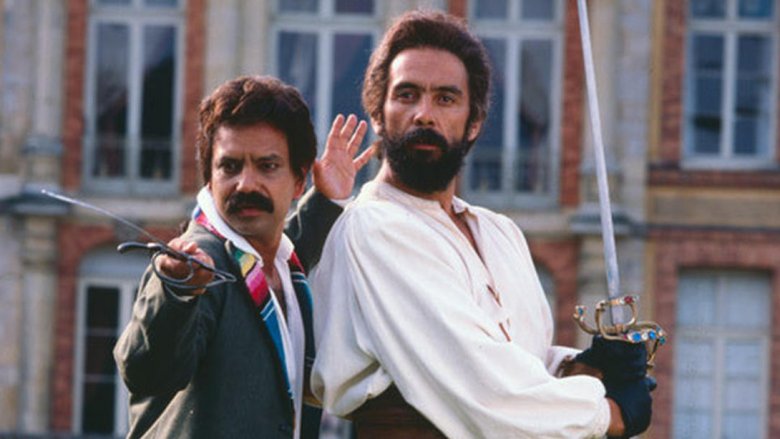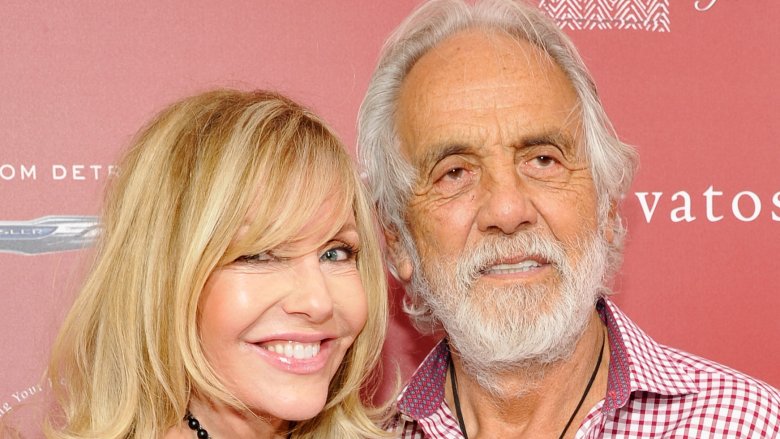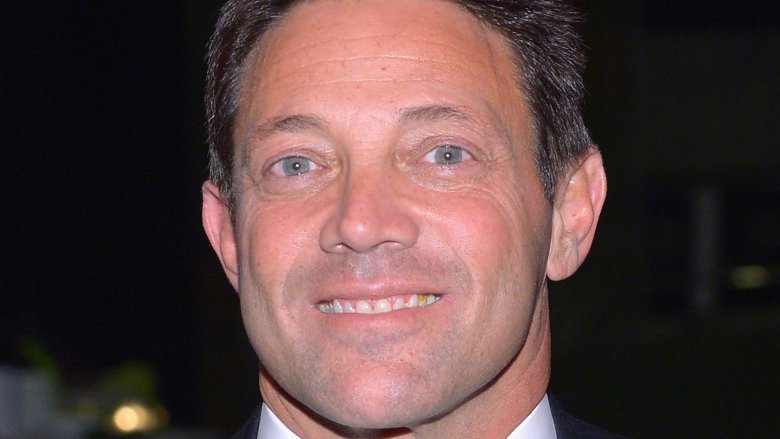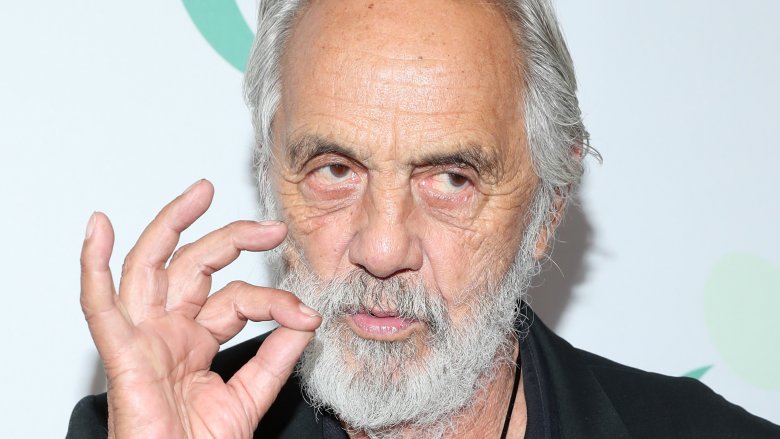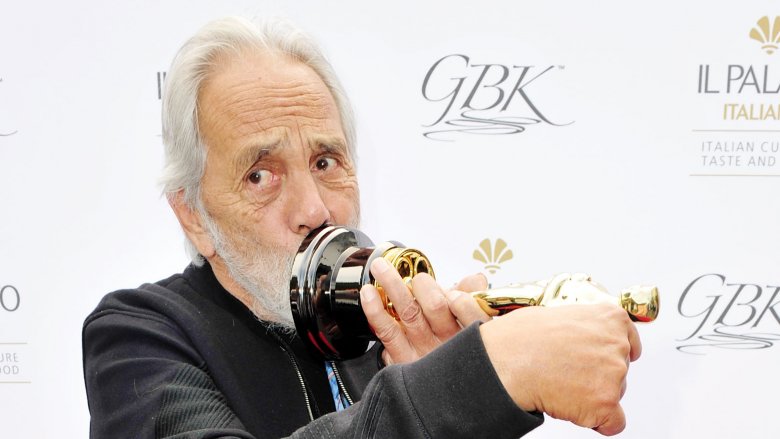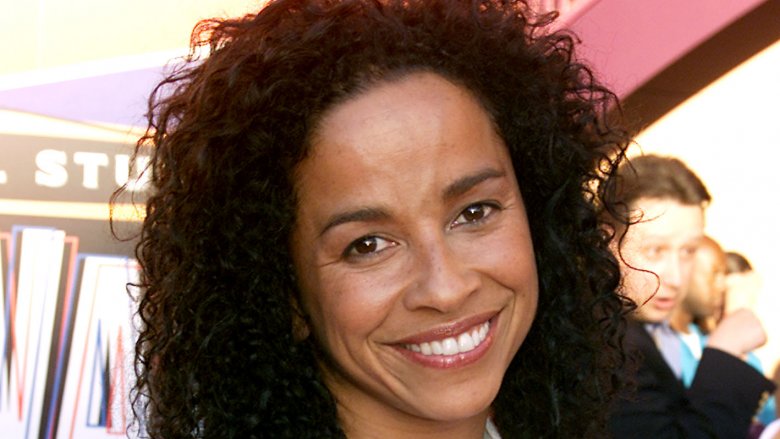The Untold Truth Of Tommy Chong
We may receive a commission on purchases made from links.
For decades, Tommy Chong has been the kindly, smiling, slightly spaced-out face of weed-based humor. He shot to fame in the early '70s as half of the venerable comedy duo Cheech and Chong, and through their albums (and later, movies), the pair brought stoner culture and their own quirky comedic sensibilities firmly into the mainstream. Unfortunately, he endured a falling out with Cheech Marin in the late '80s, but they have since mended fences, making sporadic live appearances together and even showing up in a 2011 episode of The Simpsons (in which Homer briefly takes Chong's place).
Many of the pair's comedy routines have become the stuff of absolute legend, but Chong in particular took a bit of an odd route on his way to becoming one of the most prominent ambassadors of weed culture on the planet. Let's take a look at the life and times of comedian, musician, actor, director and "Pope of Pot" Tommy Chong — the man who taught us all to kick back, mellow out, and stop worrying about where Dave is (he's not here, man).
He's from Canada, eh?
Tommy was born Thomas B. Kin Chong in 1938, to a Scottish-Irish mother (a waitress) and a Chinese father (a truck driver). It may seem reasonable to assume that he was born smack in the middle of some future marijuana hotspot such as L.A. or San Francisco. However, Chong is actually from Edmonton, Alberta, making him the most noteworthy Canadian purveyor of dopey humor this side of famous hosers Bob and Doug McKenzie. Today, he's a naturalized American citizen, but he's still quite proud of his Canadian heritage — particularly in light of his home country's recent legalization of his favorite green, leafy substance.
Despite a false start involving a typical stoner problem (he temporarily lost his passport), Chong even made it up to Kelowna, British Columbia shortly after the law passed to celebrate with fellow heads. There, he offered a typically hilarious observation on the new law: "It makes me feel good about my country, proud to be a Canadian...I think they should build a statue of me somewhere. Not in Edmonton where I was born because it is too cold there even for a statue. Not in Vancouver because there are too many pigeons. Maybe in Victoria, I love that city."
He started out as a musician
Growing up as a child of mixed-race heritage in the '50s was tough even in Canada, and for Chong, his escape from the teasing and bullying was the blues. He began playing guitar at an early age, and at 17 — directly after smoking his first joint — he resolved to become a professional blues musician. In the early '60s, he was playing with an outfit called Bobby Taylor and the Vancouvers when fame came knocking in the form of legendary Supremes vocalist Diana Ross, who caught their act and insisted that Motown head honcho Berry Gordy sign them immediately.
The band enjoyed some success while signed to Motown, notching a #29 hit in 1968 with the R&B tune "Does Your Mama Know About Me" (which Chong co-wrote). But shortly thereafter, Chong was fired by the group's manager for dragging his feet applying for a green card, which would have enabled him to work and tour in the U.S. Fortunately for Chong, however, it was right around this time that he met Richard "Cheech" Marin in Vancouver, and the pair began making the club rounds after forming their own band. But fate would dictate their course — the duo quickly noticed that their crowds had a much stronger positive reaction to their loopy pre-set patter than their actual music, and it wasn't long before they decided to make the switch to comedy full-time.
He's a Grammy-winning recording artist
The newly-rechristened Cheech and Chong swiftly caught the attention of record producer Lou Adler, who helped the pair refine their standup routines into what would become the first of many successful comedy albums, 1971's Cheech and Chong. The debut included several classic routines, including "Blind Melon Chitlin'," "Trippin' in Court," and the legendary "Dave." It was followed by 1972's Big Bambu (which came with an LP-sized rolling paper) and 1973's Los Cochinos — both of which went all the way to #2 on the Billboard album charts. Through these releases, the pair firmly established the personas of "Pedro" (Cheech) and "Man" (Chong) which would later appear in their classic films — but while their humor was certainly weed-infused, it was anything but lazy.
Cheech and Chong's knack for pinpoint comic timing and twisty wordplay was reminiscent of such iconic comedy duos as Abbott and Costello and Laurel and Hardy, and by '73, their profile was high enough for Los Cochinos to earn them a Grammy Award for Best Comedy Recording. Additional albums would follow in '74 and '76, but the constant recording and touring was beginning to take a toll — enough so that, for a brief moment, the duo considered calling it quits.
He almost quit before becoming a movie star
Cheech in particular was not enamored of the demands of the road, and in an interview with A.V. Club, Chong related how his own offhand suggestion may have saved the duo from an early demise: "Cheech was really tired of touring," he said, "and even back then, he was thinking of quitting. But I said to him, 'We can't quit. We should do a movie.' So we told Lou Adler about it, and he got some money; we wrote a script and made the film."
That film — consisting largely of improv and made on a shoestring budget — was 1978's Up in Smoke, the first stoner comedy and one which would set a standard for all that followed. As with their records, the movie borrowed heavily from their stage shows, sending "Pedro" and "Man" on an insane adventure involving a drunk judge, a van literally made out of weed, and the most ridiculous Battle of the Bands ever. Critics hated it, but audiences didn't care; the film was a smash hit and instantly established the duo as viable movie stars. Lou Adler received directorial credit, but in the same interview, Chong took slight issue with this, saying, "I mean, he certainly got most of the money from it, but I did a lot of the directing...you know, you reap what you sow, and Lou Adler might have a lot of money now, but he's still ugly."
The real reason for the Cheech and Chong split
The success of Up in Smoke meant that more movies, continuing to mine material from the duo's days on the road, quickly followed. Cheech and Chong's Next Movie (1980), Nice Dreams (1981), Things Are Tough All Over (1982) and Still Smokin' (1983) were all successful to varying degrees, but by this time, differing ambitions were starting to cause a rift between the two. To hear Cheech tell it, Chong's role as director of three of those four films was feeding his ego: "It affects your personality, especially being a director, because you're God," he said in a CBS News interview. "He was the creative genius, and I was the actor and I was lucky to be there — uh, I don't think so."
Chong, however, remembers the split a bit differently. "Cheech had already decided at that point that he wanted to stop doing dope humor," he said. "He wanted to do more acting and move away from the dope humor, and I wanted to continue doing what I was doing." The filmography bears this out: 1984's The Corsican Brothers (during the filming of which Chong says he was "going through the motions") contained no drug humor whatsoever, and Cheech's next onscreen appearance was in 1987's Born in East L.A. — a conventional comedy in which there was no Chong to be found.
He went to prison to spare his wife and son
The split from Cheech began a rough period for Chong, in which his TV and film appearances would be few and far between for over a decade. After a smattering of cameos in movies like Half Baked, his next significant gig wouldn't come until 1999, when he joined the cast of the hit sitcom That '70s Show as fun-loving, spaced-out hippie Leo. But with the advent of the internet age, Chong, his wife Shelby, and their son Paris embarked on a different kind of business venture — one which would eventually land the star in a giant heap of trouble.
Through their company Nice Dreams Enterprises, the trio had established a series of head shops, and had also branched out into selling bongs over the internet. In a case of supremely bad timing, the U.S. government was cracking down on the sale of paraphernalia, especially internet businesses which sold such items across state lines. Chong was caught up in a wide-scale investigation known as Operation Pipe Dreams, and in 2003 he agreed to plead guilty to conspiring to distribute drug paraphernalia, in exchange for non-prosecution of his wife and son. He was handed a nine-month prison sentence, which he dutifully served, taking a hiatus from That '70s Show in order to do his time. He says he received a "hero's welcome" upon reporting to the Big House — plus, he became fast friends with his interesting new cellmate.
Chong and the Wolf
Chong served his sentence at Taft minimum security prison in California, and he was not the only famous person doing time there. He ended up bunking with Jordan Belfort, the "Wolf of Wall Street," who was delighted by his good fortune. In a Hollywood Reporter interview, Belfort said of his prison experience, "It was minimum security, and...it was like a boys' club. And who's my bunkmate? Tommy Chong from Cheech and Chong. I couldn't believe it."
As it turned out, Chong was good for more than passing the time with hilarious stories. "He was in the process of writing his book. We used to tell each other stories at night, and I had him rolling hysterically on the floor. The third night he goes, 'You've got to write a book.' So I started writing, and I knew it was bad. It was terrible." But upon his release, Belfort found himself idle, and Chong's suggestion stuck with him. An insomniac, Belfort took to writing for hours upon hours every day and into the night — and after nearly a year, he finally managed to finish his memoir. The Wolf of Wall Street was a raging success and was adapted into Martin Scorsese's award-winning 2013 film, and Belfort got to see himself onscreen portrayed by Leonardo DiCaprio — none of which might have come to pass if he had had a less groovy cellmate. Chong did eventually finish his book, too, titled The I Chong: Meditations from the Joint.
He's battled cancer... and smoked his way out
Chong is prone to stating flatly that weed cures cancer, which is not exactly medically accurate, despite what it can do for pain management and anxiety relief. Then again, he has done battle with the Big C himself, and you probably don't have to think too hard to guess his preferred method of treatment. In a Rolling Stone interview, Chong blamed his stint in prison for his condition, saying, "I'm a big believer in the medical benefits of marijuana, which helped me with the cancer, which I got in prison. The prison was built over a toxic waste dump and when I went in there I was totally healthy and when I came out, I had prostate cancer. I treated it with hash oil."
To be fair, Chong also credits a change in diet and lifestyle with helping to rid him of the disease, which returned in 2015 in the form of colorectal cancer. That time, he took a slightly more conventional approach, undergoing chemotherapy in the hopes of reducing the risk of recurrence. He also kept up diligently with his diet and, of course, his intake of hash oil — and by 2016, he was able to declare himself cancer free once again.
He's gotten high with everyone
As one might imagine, Chong claims to have smoked with virtually everybody who was getting high in the '60s and '70s — which is to say, virtually everybody, period. When asked by Rolling Stone to name a few famous people he'd had the pleasure of smoking with, he was quick to name names. He claims to have shared many a joint over the years with basketball great Kareem Abdul-Jabbar, who Chong says "played basketball eight years past his prime because he was and still is a big, big pothead," as well as Arnold Schwarzenegger, whom Chong calls "one of the healthiest guys on the planet."
Also, of course, there were smoking sessions with famous musicians: jazz guitar icon Wes Montgomery, folk songstress Joni Mitchell, and — interestingly enough — "every Beatle except Paul," whom he says was the only member of the fabled band who was "truly a pothead." In particular, Chong has fond memories of smoking up many times with George Harrison, recalling one wild party in Malibu: "It was really funny because, remember Tony Dow from Leave It to Beaver? He was Wally. He was at the party, too. So, I had the joint, I handed it to George, George took a toke, handed it back to me, and I looked and there's Tony Dow...and I couldn't resist, I said, 'Gee, Wally, does the Beaver know about this?' And he gave me this disgusted look...but he smoked up."
The legend lives on
Now over the age of 80, Chong doesn't appear to be going anywhere anytime soon — but when he finally heads off to the great dispensary in the sky, his many children will still be around to carry on his legacy. In fact, the chances are very good that you've seen at least one of his kids on a screen large or small at some point, whether you knew it or not. His most famous offspring is perhaps eldest daughter Rae Dawn Chong, whose breakout role in 1981's Quest for Fire led to a role opposite her Dad's former smoking buddy Arnold Schwarzenegger in 1985's Commando, one of the purest distillations of '80s action cheese.
But Rae Dawn isn't the only one of Chong's kids to catch the acting bug; there's also daughter Robbi (who has appeared on the small screen in such series as Poltergeist: The Legacy and The Outer Limits), youngest daughter Precious (who landed roles in L.A. Confidential and Pearl Harbor), and youngest son and business partner Paris (who appeared in minor roles in Far Out Man and Senior Trip). But perhaps the most familiar face of all of Chong's offspring: older son Marcus, whose long list of credits includes the role of Tank in the sci-fi classic The Matrix. Yes, the guy who rescued Neo and Trinity from certain death at the hands of the turncoat Cypher was the son of Tommy Chong. No wonder he was such a cool dude.
